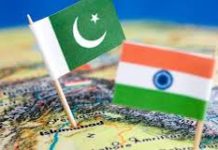By Web Desk
Reacting to international media reports about biased content regulation policies of Facebook Incorporated , Pakistan’s Information Technology Minister Aminul Haque has expressed “serious concern” over social media giant’s alleged policies favouring Modi and his Hindu nationalist Bharatiya Janata Party (BJP).
A report by The Wall Street Journal that Facebook Inc’s content regulation policies favoured Indian Prime Minister Narendra Modi’s party shows that the social media giant is “no longer impartial” and it must take practical steps to redeem its independence, Minister for Information Technology and Telecommunication Aminul Haque said on Thursday.
The world’s largest social network is battling a public relations and political crisis in India after WSJ reported last week that Facebook’s top lobbying executive in India, Ankhi Das, opposed applying its hate-speech rules to a member of Modi’s party and at least three other Hindu nationalist individuals and groups “flagged internally for promoting or participating in violence”, English newspaper Daily Dawn reported.
Pakistan’s IT Minister said that the company had continuously ignored hate speech and sectarian content shared by BJP leaders and workers.
Haque said a proof of the allegation that Facebook “holds a soft corner for the BJP and RSS (Rashtriya Swayamsevak Sangh)” was that it had flagged as “hate speech” posts put up by users across the world condemning the Indian government’s move to revoke occupied Kashmir’s semi-autonomous status on August 5 last year and impose a crippling curfew in the region. The company also suspended the accounts that shared the posts, he added.
“Facebook remembers all rules and regulations about publicising Indian atrocities on Kashmiris but when it comes to heavy investments and a majority of employees being Indian in regional offices, the Facebook administration due to financial gains overlooks all moral values and codes to adopt a criminal silence,” the minister said, noting that a similar policy was observed while treating posts related to Israeli suppression in Palestine.
He said Facebook’s clarifications were in contradiction to its actions and it would need to take “sincere and practical steps” to clear its name.
Haque asked Facebook to clarify why there was a difference between its policies for users in India and in Pakistan.
He said Facebook needed to remember that if India had 250 million social media users, Pakistan too “is emerging as a major market of the digital world” and those ignoring its importance “will be at a loss”.
The WSJ article has sparked a political storm in India and raised questions about Facebook’s content regulation practices.
The report said that Das had told staff members that punishing violations by politicians from Modi’s party “would damage the company’s business prospects in the country”.
Facebook, which has more than 300 million users in India, referred on Monday to a weekend statement that said it prohibited hate speech irrespective of one’s political position but acknowledged, “There is more to do.”















